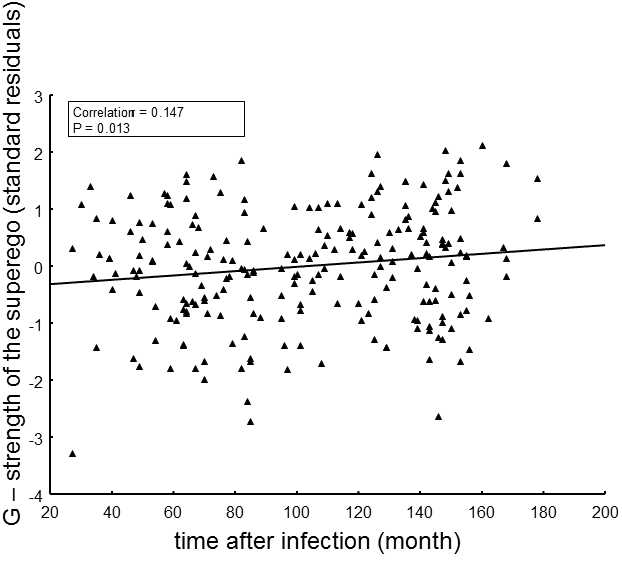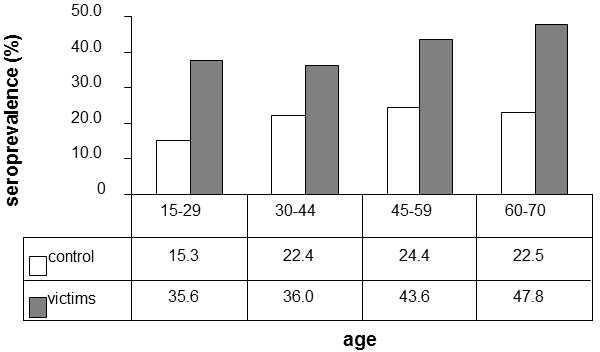XIX.6.5.4 Manifestations of manipulative parasite activity can also be found in humans
The effect of a parasite on human behavior has been observed in a great many systems.For example, explanations have been given for the negative effect of various parasitic infections (Ascaris, Trichuris, Schistosoma, Toxoplasma) on intelligence and learning ability (Nokes & Bundy 1994; Piekarski 1981; Saxon et al. 1973). The older clinical literature described changes in behavior in humans who have suffered from chronic streptococcal infection (melancholia).A number of works point to a correlation between the occurrence of the protozoa Toxoplasma gondii and some psychological disorders and the effect of this protozoa on the psychological profile of humans (Cook & Derrick 1961; Ladee, Scholten, & Meyes 1966; Robertson 1965; Flegr & Hrdy 1994; Flegr et al. 1996){13300}.
However, in most of these cases, it is difficult to decide when this is a more or less unspecific symptom of the current or recent disease and when it is a manifestation of targeted influencing ofthe host’s behavior by the parasite.It is obvious that the behavior of a sick person will differ from that of a healthy person and that prolonged sickness can even be manifested in personality changes and thus, secondarily, on the way he will act in certain situations.In addition, most results are based on monitoring the correlation between the frequency of the occurrence of a particular parasite and a certain type of behavior in the monitored persons.In these situations, it is difficult to decide whether the presence of the parasite induced the observed changes in these persons, or whether a certain type of behavior in the observed persons increased the probability of infection by this parasite.Of course, a third possibility also exists, i.e. that both the changes in behavior and the infection by the particular parasite are both caused by a third, unknown factor.If the research is based on study of a large group of persons, then it would be possible to demonstrate statistically significant correlation arising as a consequence of the indirect effect of a very weak factor.
So far, the best-documented example of the existence of manipulative activity of a parasite in humans is the effect of latent asymptomatic infection by the protozoa Toxoplasma gondii on the psychological profile of humans, which was first described by Czech parasitologists (Flegr & Hrdy 1994; Flegr et al. 1996){13300}.In nature, Toxoplasma is transmitted from its intermediate host, mostly mice rodents, to cats, its definitive host, through predation.An infected cat excretes resistant oocysts in its faeces, which can infect a wide spectrum of intermediate host species, including mice and humans.Infected persons generally have a mild form of the disease and, without realizing it, become carriers of the latent stage of the parasite to the end of their lives.It has been estimated that 30-50% of people in the Czech Republic have suffered from toxoplasmosis, while a figure of 83% has been given for Paris, France.Comparison of the psychological profile of persons infected and not infected by the parasite has revealed statistically significant differences in a number of monitored factors, including a tendency to look for new stimuli (Fig. XIX.15).It is interesting that different factors were affected in men and women and, when the changes were related to the same psychological factor, the shift mostly occurred in the opposite direction in men and women.When changes in these factors were examined for former patients who had suffered from acute toxoplasmosis in the past, i.e. persons for which records exist of when they were infected, it was found that there is a positive correlation between the time that had expired from the infection and the level of change in the psychological factors (Fig. XIX.16).This indicates that, at least in this

Fig. XIX.16 Increase in the differences between women infected and not infected by the protozoa Toxoplasma gondii with the time expired since the infection. The graph shows a positive correlation between the strength of the superego, i.e. primarily willingness to respect generally accepted social standards, and the time that had expired since the particular woman was diagnosed with acute toxoplasmosis. The effect of the age of the studied persons was eliminated statistically. Amongst men, individuals with toxoplasmosis exhibited a lower strength of the superego than uninfected persons. Amongst them, a statistically significant correlation was found between the strength of the superego and the time that had expired since the infection; however, in this case, the correlation was negative (Flegr et al. 1996). The strength of the superego was measured using the Cattel 16 PF questionnaire. According to Flegr et al. (2000).
case, the psychological changes were caused by the infection and not the infection by a change in psychological factors.In addition, latent toxoplasmosis is asymptomatic in practically all humans, so it cannot be expected that the psychological changes would occur as a result of unspecific deterioration of the state of health of the infected persons.However, the results of four studies of correlation between latent toxoplasmosis and the risk of traffic accidents indicate that the generally accepted assumption of harmlessness of latent “symptom-free” toxoplasmosis might not be valid and that this “harmless” parasitosis could, in fact, be responsible for more human fatalities than malaria (Fig. XIX.17).

Fig. XIX.17 Greater fraction of persons infected by the protozoa Toxoplasma gondii amongst the victims of traffic accidents compared with the general population. The frequency of toxoplasmosis amongst participants in traffic accidents (drivers and pedestrians) in the territory of inner Prague was compared with the frequency of toxoplasmosis in a control set of persons with permanent residence in the same area. It was found from the difference in the two frequencies that persons with toxoplasmosis have an approximately 2.6-fold greater risk of an accident that uninfected persons. Because the relative risk of an accident is correlated with the level of specific antitoxoplasmotic antibodies, it is probable that toxoplasmosis is the actual cause of the increased risk of accidents amongst infected persons. Simultaneously, it is not clear whether the greater risk of traffic accidents is caused by changes in the psychological profile of infected persons or prolonging of their reaction time or their reduced concentration ability (Havlicek et al. 2001). According to Flegr et al. (2002).
